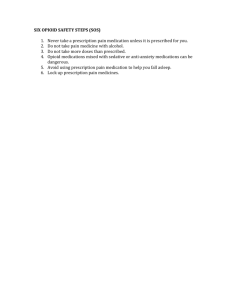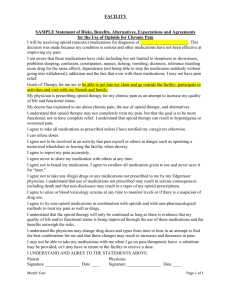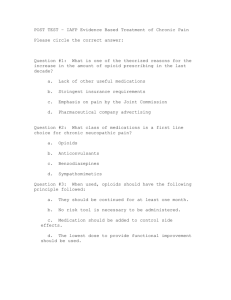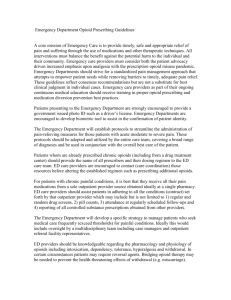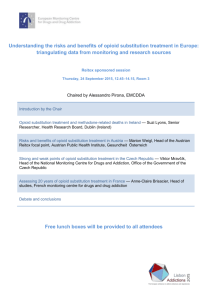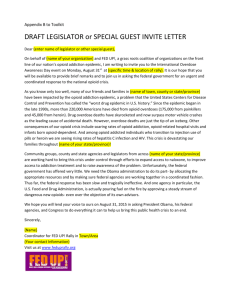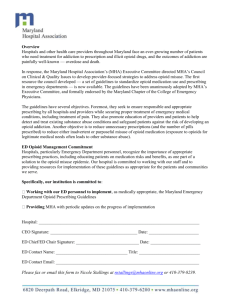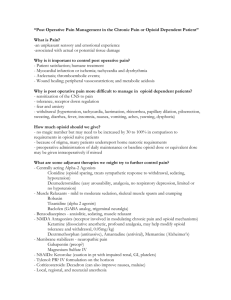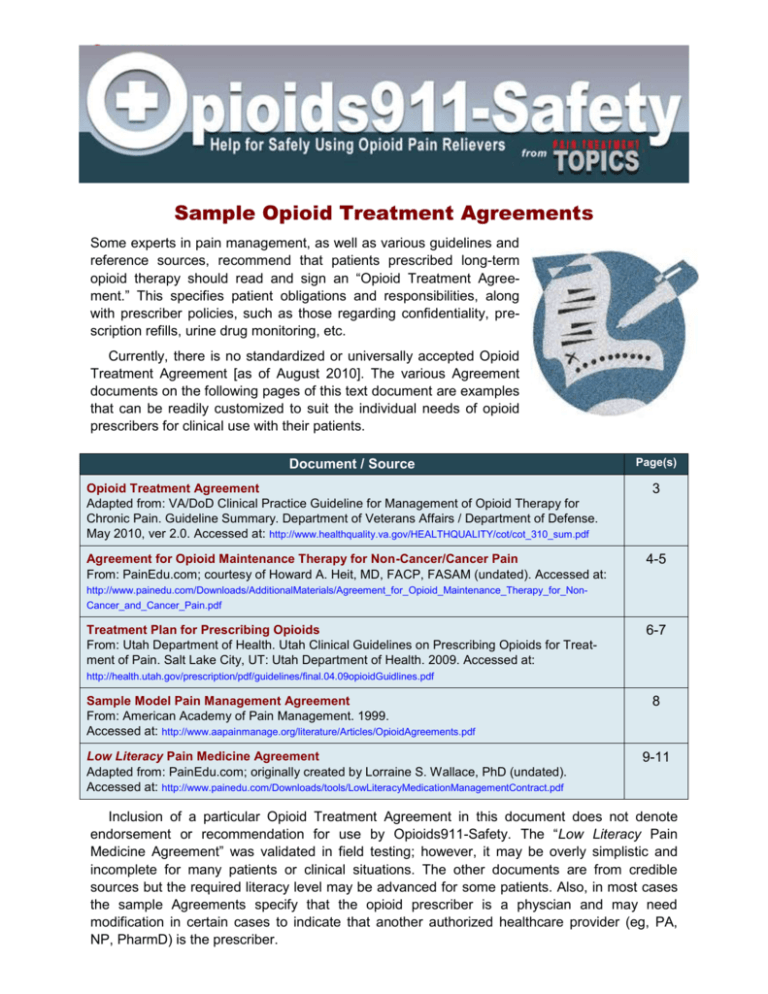
http://Opioids911.org
1
Sample Opioid Treatment Agreements
Some experts in pain management, as well as various guidelines and
reference sources, recommend that patients prescribed long-term
opioid therapy should read and sign an “Opioid Treatment Agreement.” This specifies patient obligations and responsibilities, along
with prescriber policies, such as those regarding confidentiality, prescription refills, urine drug monitoring, etc.
Currently, there is no standardized or universally accepted Opioid
Treatment Agreement [as of August 2010]. The various Agreement
documents on the following pages of this text document are examples
that can be readily customized to suit the individual needs of opioid
prescribers for clinical use with their patients.
Document / Source
Opioid Treatment Agreement
Adapted from: VA/DoD Clinical Practice Guideline for Management of Opioid Therapy for
Chronic Pain. Guideline Summary. Department of Veterans Affairs / Department of Defense.
May 2010, ver 2.0. Accessed at: http://www.healthquality.va.gov/HEALTHQUALITY/cot/cot_310_sum.pdf
Agreement for Opioid Maintenance Therapy for Non-Cancer/Cancer Pain
From: PainEdu.com; courtesy of Howard A. Heit, MD, FACP, FASAM (undated). Accessed at:
Page(s)
3
4-5
http://www.painedu.com/Downloads/AdditionalMaterials/Agreement_for_Opioid_Maintenance_Therapy_for_NonCancer_and_Cancer_Pain.pdf
Treatment Plan for Prescribing Opioids
From: Utah Department of Health. Utah Clinical Guidelines on Prescribing Opioids for Treatment of Pain. Salt Lake City, UT: Utah Department of Health. 2009. Accessed at:
6-7
http://health.utah.gov/prescription/pdf/guidelines/final.04.09opioidGuidlines.pdf
Sample Model Pain Management Agreement
From: American Academy of Pain Management. 1999.
Accessed at: http://www.aapainmanage.org/literature/Articles/OpioidAgreements.pdf
Low Literacy Pain Medicine Agreement
Adapted from: PainEdu.com; originally created by Lorraine S. Wallace, PhD (undated).
Accessed at: http://www.painedu.com/Downloads/tools/LowLiteracyMedicationManagementContract.pdf
8
9-11
Inclusion of a particular Opioid Treatment Agreement in this document does not denote
endorsement or recommendation for use by Opioids911-Safety. The “Low Literacy Pain
Medicine Agreement” was validated in field testing; however, it may be overly simplistic and
incomplete for many patients or clinical situations. The other documents are from credible
sources but the required literacy level may be advanced for some patients. Also, in most cases
the sample Agreements specify that the opioid prescriber is a physcian and may need
modification in certain cases to indicate that another authorized healthcare provider (eg, PA,
NP, PharmD) is the prescriber.
http://Opioids911.org
2
There has been some controversy surrounding the advantages of Opioid Treatment
Agreements (sometimes erroneously referred to as “Contracts”) due to a lack of research on
their effectiveness in benefitting treatment outcomes, and there are some questions as to
whether most patients fully comprehend their meaning and significance. This subject was
discussed in an edition of the Pain Treatment Topics e-Briefing Newsletter (which can be
accessed at: http://pain-topics.org/pdf/e-Briefing-Vol2-No2-2007.pdf).
Opioid Treatment Agreements do not substitute for patient education on opioid safety. A
primary benefit of such Agreements may be in establishing a clear set of rules governing the
relationship between prescriber and patient. Agreements are often especially recommended (or
required) in patients at high risk for opioid medication abuse or having a history of substance
abuse or psychiatric comorbidity. The Agreement does not necessarily replace an “Informed
Consent for Opioid Treatment,” which spells out potential risks and hazards of opioid therapy
(eg, adverse reactions, physical dependence, addiction, overdose, special instructions for use,
and other cautions).
Section 2E of the Opioids911-Safety patient/caregiver education program — titled, What is
an opioid treatment agreement? — describes for patients and their caregivers “Rules of the
Road” for using opioid medicines, including patient responsibilities that are generally a part of
any formal Agreement. Patients are instructed that, even if they are not asked to sign an
Agreement document, for their own safety and the protection of others they must be willing to
follow the “Rules” that are listed.
Researcher: Stewart B. Leavitt, MA, PhD
Document Date: First publication September 2010
Disclaimer: The contents of Opioids911-Safety are not intended to offer medical advice and should not be used for diagnosing or
treating particular health conditions.
© Copyright 2010, Opioids911-Safety from Pain Treatment Topics (SBL Ltd, Glenview, IL 60025). All rights reserved
under a Creative Commons Attribution-NonCommercial 3.0 Unported License.
http://Opioids911.org
3
Opioid Treatment Agreement
1. I understand that my provider and I will work together to find the most appropriate treatment for my
chronic pain. I understand the goals of treatment are not to eliminate pain, but to partially relieve my
pain in order to improve my ability to function. Chronic opioid therapy is only ONE part of my overall
pain management plan.
2. I understand that my provider and I will continually evaluate the effect of opioids on achieving the
treatment goals and make changes as needed. I agree to take the medication at the dose and frequency prescribed by my provider. I agree not to increase the dose of opioids on my own and understand that doing so may lead to the treatment with opioids being stopped.
3. I understand that the common adverse effects of opioid therapy include constipation, nausea, sweating, and itchiness of the skin. Drowsiness may occur when starting opioid therapy or when increasing
the dosage. I agree to refrain from driving a motor vehicle or operating dangerous machinery until
such drowsiness disappears.
4. I will not seek opioid medications from another physician for the treatment of my chronic pain. Regular follow-up care is required and only my provider will prescribe these medications for my chronic
pain for me at scheduled appointments.
5. I will attend all appointments, treatments, and consultations as requested by my providers. I will attend all pain appointments and follow pain management recommendations.
6. I will not give or sell my medication to anyone else, including family members; nor will I accept any
opioid medication from anyone else. I agree to be responsible for the secure storage of my medication at all times. If these medications are stolen, I will report this to police and my provider and will
produce a police report of this event if requested to do so.
7. I understand that if my prescription runs out early for any reason (for example, if I lose the medication
or take more than prescribed), my provider may not prescribe extra medication for me. I may have to
wait until the next prescription is due.
8. I understand that the use of other medications can cause adverse effects or interfere with opioid therapy. Therefore, I agree to notify my provider of the use of all substances, including marijuana, alcohol, medications not prescribed for me (tranquilizers), and all illicit drugs.
9. I agree to periodic unscheduled drug screens.
10. I understand that I may become physically dependent on opioid medications, which in a small number
of patients may lead to addiction. I agree that if necessary, I will permit referral to addiction specialists
as a condition of my treatment plan.
11. I understand that my failure to meet these requirements may result in my provider choosing to stop
writing opioid prescriptions for me. Withdrawal from the medications will be coordinated by the provider and may require specialist referrals.
12. I hereby agree that my provider has the authority to discuss my pain management with other health
care professionals and my family members when it is deemed medically necessary in the provider’s
judgment.
13. My providers may obtain information from State controlled substances databases and other prescription monitoring programs.
Signatures: ________________________________
____________________________________
http://Opioids911.org
4
Agreement for Opioid Maintenance Therapy
for Non-Cancer/Cancer Pain
The purpose of this agreement is to give you information about the medications you will be taking for pain
management and to assure that you and your physician comply with all state and federal regulations concerning the prescribing of controlled substances. A trial of opioid therapy can be considered for moderate
to severe pain with the intent of reducing pain and increasing function. The physician’s goal is for you to
have the best quality of life possible given the reality of your clinical condition. The success of treatment
depends on mutual trust and honesty in the physician/patient relationship and full agreement and understanding of the risks and benefits of using opioids to treat pain.
1. You should use one physician to prescribe and monitor all opioid medications and adjunctive analgesics.
2. You should use one pharmacy to obtain all opioid prescriptions and adjunctive analgesics prescribed
by your physician.
Pharmacy: __________________________ Phone number: _____________________
3. You should inform your physician of all medications you are taking, including herbal remedies, since
opioid medications can interact with over-the-counter medications and other prescribed medications,
especially cough syrup that contains alcohol, codeine or hydrocodone.
4. You will be seen on a regular basis and given prescriptions for enough medication to last from appointment to appointment, plus usually two to three days extra. This extra medication is not to be
used without the explicit permission of the prescribing physician unless an emergency requires your
appointment to be deferred one or two days.
5. Prescriptions for pain medicine or any other prescriptions will be done only during an office visit or
during regular office hours. No refills of any medications will be done during the evening or on weekends.
6. You must bring back all opioid medications and adjunctive medications prescribed by your physician
in the original bottles.
7. You are responsible for keeping your pain medication in a safe and secure place, such as a locked
cabinet or safe. You are expected to protect your medications from loss or theft. Stolen medications
should be reported to the police and to your physician immediately. If your medications are lost, misplaced or stolen, your physician may choose not to replace the medications or to taper and discontinue the medications.
8. You may not give or sell your medications to any other person under any circumstances. If you do,
you may endanger that person’s health. It is also against the law.
9. Any evidence of drug hoarding, acquisition of any opioid medication or adjunctive analgesia from other physicians (which includes emergency rooms), uncontrolled dose escalation or reduction, loss of
prescriptions, or failure to follow the agreement may result in termination of the doctor/patient relationship.
10. You will communicate fully to your physician to the best of your ability at the initial and all follow-up
visits your pain level and functional activity along with any side effects of the medications. This information allows your physician to adjust your treatment plan accordingly.
11. You should not use any illicit substances, such as cocaine, marijuana, etc. while taking these medications. This may result in a change to your treatment plan, including safe discontinuation of your opioid
medications when applicable or complete termination of the doctor/patient relationship.
http://Opioids911.org
5
12. The use of alcohol and opioid medications is contraindicated.
13. You agree and understand that your physician reserves the right to perform random or unannounced
urine drug testing. If requested to provide a urine sample, you agree to cooperate. If you decide not to
provide a urine sample, you understand that your doctor may change your treatment plan, including
safe discontinuation of your opioid medications when applicable or complete termination of the doctor/patient relationship. The presence of a non-prescribed drug(s) or illicit drug(s) in the urine can be
grounds for termination of the doctor/patient relationship. Urine drug testing is not forensic testing, but
is done for your benefit as a diagnostic tool and in accordance with certain legal and regulatory materials on the use of controlled substances to treat pain.
14. There are side effects with opioid therapy, which may include, but not exclusively, skin rash, constipation, sexual dysfunction, sleeping abnormalities, sweating, edema, sedation, or the possibility of impaired cognitive (mental status) and/or motor ability. Overuse of opioids can cause decreased respiration (breathing).
15. Physical dependence and/or tolerance can occur with the use of opioid medications.
Physical dependence means that if the opioid medication is abruptly stopped or not taken as directed, a withdrawal syndrome can occur. This is a normal physiological response. The withdrawal syndrome could include, but not exclusively, sweating, nervousness, abdominal cramps,
diarrhea, goose bumps, and alterations in one’s mood. It should be noted that physical dependence does not equal addiction. One can be dependent on insulin to treat diabetes or dependent
on prednisone (steroids) to treat asthma, but one is not addicted to the insulin or prednisone.
Addiction is a primary, chronic neurobiologic disease with genetic, psychosocial and environmental factors influencing its development and manifestation. It is characterized by behavior that
includes one or more of the following: impaired control over drug use, compulsive use, continued
use despite harm, and cravings. This means the drug decreases one’s quality of life.
Tolerance means a state of adaptation in which exposure to the drug induces changes that result
in diminution of one or more of the drug’s effects over time. The dose of the opioid may have to
be titrated up or down to a dose that produces maximum function and a realistic decrease of the
patient’s pain.
16. If you have a history of alcohol or drug misuse/addiction, you must notify the physician of such history
since the treatment with opioids for pain may increase the possibility of relapse. A history of addiction
does not, in most instances, disqualify one for opioid treatment of pain, but starting or continuing a
program for recovery is a must.
17. You agree to allow your physician to contact any health care professional, family member, pharmacy,
legal authority, or regulatory agency to obtain or provide information about your care or actions if the
physician feels it is necessary.
18. You agree to a family conference or a conference with a close friend or significant other if the physician feels it is necessary.
The above agreement has been explained to me by [INSERT PRESCRIBER NAME HERE]. I agree to its
terms so that [INSERT PRESCRIBER NAME HERE] can provide quality pain management using opioid
therapy to decrease my pain and increase my function.
Patient’s Signature ___________________________________ Date__________________________
Witness’s Signature __________________________________ Date___________________________
http://Opioids911.org
6
Treatment Plan Using Prescription Opioids
Patient name: _____________________________________________________________________
Prescriber name: __________________________________________________________________
THE PURPOSE OF THIS AGREEMENT IS TO STRUCTURE OUR PLAN TO WORK TOGETHER TO
TREAT YOUR CHRONIC PAIN. THIS WILL PROTECT YOUR ACCESS TO CONTROLLED
SUBSTANCES AND OUR ABILITY TO PRESCRIBE THEM TO YOU.
I (patient) understand the following (initial each):
_____ Opioids have been prescribed to me on a trial basis. One of the goals of this treatment is to improve my ability to perform various functions, including return to work. If significant demonstrable improvement in my functional capabilities does not result from this trial of treatment,
my prescriber may determine to end the trial.
Goal for improved function: _______________________________________________
_____ Opioids are being prescribed to make my pain tolerable but may not cause it to disappear entirely. If that goal is not reached, my physician may end the trial.
Goal for reduction of pain: ________________________________________________
_____ Drowsiness and slowed reflexes can be a temporary side effect of opioids, especially during
dosage adjustments. If I am experiencing drowsiness while taking opioids, I agree not to drive
a vehicle or perform other tasks that could involve danger to myself or others.
_____ Using opioids to treat chronic pain will result in the development of a physical dependence on
this medication, and sudden decreases or discontinuation of the medication will lead to symptoms of opioid withdrawal. These symptoms can include: runny nose, yawning, large pupils,
goose bumps, abdominal pain and cramping, diarrhea, vomiting, irritability, aches and flu-like
symptoms. I understand that opioid withdrawal is uncomfortable but not physically life threatening.
_____ There is a risk that opioid addiction can occur. Almost always, this occurs in patients with a personal or family history of other drug or alcohol abuse. If it appears that I may be developing
addiction, my physician may determine to end the trial.
I agree to the following (initial each):
_____ I agree not to take more medication than prescribed and not to take doses more frequently than
prescribed.
_____ I agree to keep the prescribed medication in a safe and secure place, and that lost, damaged,
or stolen medication will not be replaced.
_____ I agree not to share, sell, or in any way provide my medication to any other person.
_____ I agree to obtain prescription medication from one designated licensed pharmacist. I understand that my doctor may check a Controlled Substance Database or Prescription Monitoring
Program at any time to check my compliance.
_____ I agree not to seek or obtain any mood-modifying medication, including pain relievers or tranquilizers from any other prescriber without first discussing this with my prescriber. If a situation
arises in which I have no alternative but to obtain my necessary prescription from another prescriber, I will advise that prescriber of this agreement. I will then immediately advise my prescriber that I obtained a prescription from another prescriber.
http://Opioids911.org
7
_____ I agree to refrain from the use of all other mood-modifying drugs, including alcohol, unless
agreed to by my prescriber. The moderate use of nicotine and caffeine are an exception to this
restriction.
_____ I agree to submit to random urine, blood or saliva testing, at my prescriber’s request, to verify
compliance with this, and to be seen by an addiction specialist if requested.
_____ I agree to attend and participate fully in any other assessments of pain treatment programs
which may be recommended by the prescriber at any time.
I understand that any deviation from the above agreement may be grounds for the prescriber to stop prescribing opioid therapy at any time.
________________________________________________________
_______________________
Patient Signature
Date
________________________________________________________
_______________________
Prescriber Signature
Date
Produced by Utah Department of Health, Prescription Pain Medication Program, 2008
http://Opioids911.org
8
SAMPLE MODEL PAIN MANAGEMENT AGREEMENT
The purpose of this Agreement is to prevent misunderstandings about certain medicines you will be taking for pain management. This is to help both you and your doctor to comply with the law regarding controlled pharmaceuticals.
I understand that this Agreement is essential to the trust and confidence necessary in a doctor/patient
relationship and that my doctor undertakes to treat me based on this Agreement.
I understand that if I break this Agreement, my doctor will stop prescribing these pain-control medicines.
In this case, my doctor will taper off the medicine over a period of several days, as necessary, to avoid
withdrawal symptoms. Also, a drug-dependence treatment program may be recommended.
I will communicate fully with my doctor about the character and intensity of my pain, the effect of the
pain on my daily life, and how well the medicine is helping to relieve the pain.
I will not use any illegal controlled substances, including marijuana, cocaine, etc.
I will not share, sell or trade my medication with anyone.
I will not attempt to obtain any controlled medicines, including opioid pain medicines, controlled stimulants, or antianxiety medicines from any other doctor.
I will safeguard my pain medicine from loss or theft. Lost or stolen medicines will not be replaced.
I agree that refills of my prescriptions for pain medicine will be made only at the time of an office visit or
during regular office hours. No refills will be available during evenings or on weekends.
I agree to use ____________________________________________Pharmacy,
located at _______________________________________________________,
telephone number _________________________, for filling prescriptions for all of my pain medicine.
I authorize the doctor and my pharmacy to cooperate fully with any city, state or federal law enforcement agency, including this state’s Board of Pharmacy, in the investigation of any possible misuse,
sale, or other diversion of my pain medicine. I authorize my doctor to provide a copy of this Agreement
to my pharmacy. I agree to waive any applicable privilege or right of privacy or confidentiality with respect to these authorizations.
I agree that I will submit to a blood or urine test if requested by my doctor to determine my compliance
with my program of pain control medicine.
I agree that I will use my medicine at a rate no greater than the prescribed rate and that use of my
medicine at a greater rate will result in my being without medication for a period of time.
I will bring all unused pain medicine to every office visit.
I agree to follow these guidelines that have been fully explained to me. All of my questions and concerns
regarding treatment have been adequately answered. A copy of this document has been given to me.
This Agreement is entered into on this ____ day of _____________, ________
Patient signature: _________________________________________________
Physician signature: _______________________________________________
Witnessed by: ____________________________________________________
http://Opioids911.org
Pain Medicine Agreement
This agreement has 4 parts.
Part 1. Tells you how and when to take your pain medicine.
Part 2. Lists things you agree to do.
Part 3. What could happen if you do NOT do the things listed in Part 2.
Part 4. Sign the form.
You and [INSERT OPIOID PRESCRIBER NAME] must sign the form.
PART 1. MY PAIN MEDICINE
PART 2. THINGS I AGREE TO DO
I will…
only get my pain medicine from [OPIOID PRESCRIBER’S]
office.
take my pain medicine as listed in Part 1.
tell my other doctor(s) that I am taking pain medicine.
tell [OPIOID PRESCRIBER] about ALL of the medicines (overthe-counter, herbs, vitamins, those ordered by other doctors) I
am taking.
tell [OPIOID PRESCRIBER] about all of my health problems.
9
http://Opioids911.org
allow [OPIOID PRESCRIBER] to talk with other doctors about my
health problems.
only ask for refills during an office visit (Monday to Friday from
10
8:00 am to 5:00 pm).
tell [OPIOID PRESCRIBER] if I get pain medicine from another doctor or
emergency room.
call [OPIOID PRESCRIBER’S] office at least 24 hours in advance if I
need to cancel my appointment.
keep my pain medicine in a safe place AND away from children.
get my pain medicine from only [INSERT PHARMACY NAME].
Address: __________________________
Phone Number: ____________________
bring all of my unused pain medicine in their pharmacy
bottles the next time I come to see [OPIOID PRESCRIBER]. He/she may
count the number of pills in my bottle(s).
allow [OPIOID PRESCRIBER] to check my urine (pee) or blood to see
what drugs I am taking.
I will NOT…
share, sell or trade my pain medicine with anyone.
use someone else’s medicine(s).
use illegal drugs (crystal meth, marijuana, cocaine).
change how I take my medicine(s) without asking [OPIOID
PRESCRIBER].
ask [OPIOID PRESCRIBER] for extra refills if I use up my supply before
my next appointment.
ask [OPIOID PRESCRIBER] for extra refills if I lose or misplace mine.
http://Opioids911.org
11
PART 3. I UNDERSTAND
If I do not do all of the things listed in Part 2,
[OPIOID PRESCRIBER]:
will no longer order pain medicine for me.
may stop giving me medical care.
may send me to drug abuse treatment.
I know…
[OPIOID PRESCRIBER] and my pharmacy may work with the police to look at any misuse or sale of my pain medicine.
If I drive while taking pain medicine, I can be charged with driving under the influence (DUI). If I am charged with DUI while
taking pain medicine, [OPIOID PRESCRIBER] is not to blame.
PART 4. SIGN THE FORM
Sign your name and write the date.
______________________________
Sign your name
__________________
Print your first name
_________________
Date
__________________________
Print your last name
__________________________________________________
Street
City
State
Zip Code
_______________________
Opioid Prescriber Name
_______________________
Opioid Prescriber Signature
_______________________
Date

